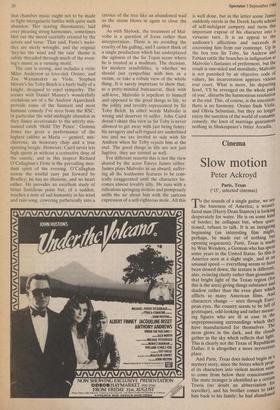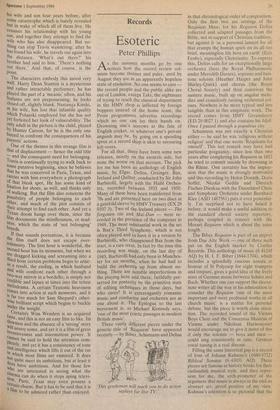Cinema
Slow motion
Peter Ackroyd
Paris, Texas
(`15'„ selected cinemas)
the sounds of a single guitar, we see the bareness of America; a weasel- faced man (Harry Dean Stanton) is looking desperately for water. He is on some kind of border; he collapses but, when clues" tioned, refuses to talk. It is an intriguing beginning (an interesting film might, perhaps, be made out of nothing but opening sequences). Paris, Texas is made by Wim Wenders, a German who has speht some years in the United States. So this Is America seen at a slight angle, and at all unusual speed — everything seems to have been slowed down; the texture is different, also, evincing clarity rather than glossiness, that bright light of the Texan region (fbi, this is the area) giving things substance anti shadow rather than the even glare which afflicts so many American films. And characters change — seen through Euro- pean eyes, the country seems to be full of grotesques, odd-looking and rather menac- ing figures who are ill at ease in the unprepossessing surroundings which theY have manufactured for themselves. Tile neon glows in the dark, and the clouds gather in the sky which reflects that light. This is clearly not the Texas of Republican Dallas: it is altogether a more mysterious place. And Paris, Texas does indeed begin as 3 mystery story, since the forces which prop- el its characters into violent motion seal to come from below their consciousneSs. The mute stranger is identified as a certain Travis (no doubt an abbreviation 101 traveller), and his brother comes to take, him back to his family; he had abandonea
his wife and son four years before, after some catastrophe which is barely revealed but in wake of which all of them live. He resumes his relationship with his young son, and together they attempt to find the Wife who has also disappeared. But no- thing can stop Travis wandering: after he has found his wife, he travels out again into the distance. 'What's out there?' his brother had said to him. 'There's nothing out there.' And that, of course, is the Point.
The characters embody this mood very well Harry Dean Stanton is a mysterious and rather intractable performer; he has Played the part of a 'meanie' often, and his features are not prepossessing: he looks Closed off, slightly blank. Nastassja Kinski, as his wife, has lost that infantile quality Which Polanski employed but she has not Yet forfeited her look of vulnerability. The Only adult in the picture is the child, played by Hunter Carson, for he is the only one forced to confront the consequences of his Parents' actions.
One of the themes in this strange film is that of displacement — hence the odd title --- and the consequent need for belonging. Travis is continually trying to walk back to some putative beginning, since he believes that he was conceived in Paris, Texas, and carries with him everywhere a photograph of that bleak spot. He has some kind of fixation for shoes, as well, and thinks only t4 walking. But the film also concerns the Possibility of people belonging to each Titer, and much of the plot consists of eir attempt to find each other. And yet a I exan doom hangs over them, since the flint documents the mindlessness, or mad- ness, which the state of 'not belonging'
breeds.
If that sounds portentous, it is because the film itself does not escape over- solemnity. The first hour is wonderful, the second hour has its moments, but when we are dragged kicking and screaming into a third hour Certain problems begin to arise: as a result, the ending, in which husband and wife confront each other through a two-way mirror in a bordello, is simply not credible and lapses at times into the tritest Melodrama. A certain Teutonic heaviness comes into action at such moments, and it is far too much for Sam Shepard's other- wise brilliant script which begins to buckle tinder the weight. Certainly Wim Wenders is an acquired ta, ste, and this is not an easy film to like. Its slowness and the absence of a 'strong' story Will annoy some, and yet it is a film of great Inventiveness and intermittent power. It cannot be said to hold the attention corn- Pletely, and yet it has a consistency of tone a. ltd intelligence which lifts it out of the rut In which most films are enmired. It does AtMt quite meet its ambitions, but at least it ?es have ambitions. And for those few W...110 are interested in seeing what the csirlema can do when it stops aping televi- ,mn, Paris, Texas may even possess a 'ertain charm. But it has to be said that it is a film to be admired rather than enjoyed.











































 Previous page
Previous page